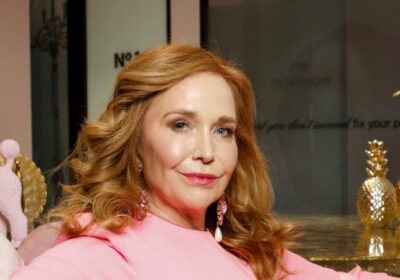‘Fertility queen’ and her IVF clinic sanctioned for breaching Ukraine egg ban

Save articles for later
Add articles to your saved list and come back to them any time.
A prominent Melbourne IVF clinic owned by “fertility queen” Dr Lynn Burmeister has had significant conditions slapped on its registration after allegedly breaching an order not to import sperm and eggs from war-torn Ukraine.
A chronic shortage of donor sperm and eggs has led fertility clinics in Australia to increasingly turn to overseas donors and international egg and sperm banks.
No.1 Fertility owner Dr Lynn Burmeister is a successful and flamboyant figure in Victoria’s fertility industry.Credit: Julian Kingma
Burmeister’s clinic, No.1 Fertility, is listed as one of several Australian partner clinics of CentraLIVF, which provides donor eggs to Australia from women in Ukraine and Georgia.
But in March last year, the regulator of the state’s IVF industry, the Victorian Assisted Reproductive Treatment Authority, suspended the importation of donor material from Ukraine.
The authority was concerned the “destructive armed conflict” could lead to the exploitation of donors and prevent donor-conceived children from accessing information about their genetic heritage.
Board member Professor Fiona Kelly said the authority had acted against No.1 Fertility after the clinic failed to abide by the directive against importing donor material from the region.
“Donors from Ukraine were living in a war zone where there was a risk of death as well as a high risk of displacement. We knew from early in the conflict that thousands of Ukrainians were leaving Ukraine and relocating to other countries,” she said.
“VARTA thought this posed a risk to the rights of donor-conceived people because of the possibility that contact with donors would be lost, and that they could have relocated outside of the relevant jurisdiction, making them very hard to track. We could not feel confident that the company in Ukraine could adequately offset this risk.”
No.1 Fertility maintains it did not deliberately breach the suspension, but that there were misunderstandings around the timing of the direction and the impact on eggs in transit.
In a statement, Burmeister, the clinic’s medical director, said it was a “confusing and chaotic” time when the Russian invasion began and “misunderstandings did occur in this challenging environment”.
“Our team was focused on looking after patients stuck in the middle of this international crisis, and we continue to focus on helping all those patients achieve their dream of having a baby.”
Burmeister said accessing donor eggs for the many women who could not use their own remained a major challenge in Australia, which led to the partnership with an “approved clinic in Ukraine to import donor eggs to Victoria in 2021”.
The specialist is often dubbed the “fertility queen” in the media, a phrase once brandished in candy neon lights on the wall of her Collins Street clinic. She was the first Australian doctor to get a woman pregnant using an ovarian tissue transplant, and she helped TV personality Sonia Kruger get pregnant at the age of 48 with a donor egg.
In 2017, Burmeister’s former employer, Monash IVF, took her to court in 2017 over her intentions to continue practising IVF despite a 12-month non-compete clause in her contract. As part of a settlement, Burmeister was banned from practising within a 50-kilometre radius of Melbourne instead of practising nowhere for 12 months.
Since then, her practice has grown to the third-largest assisted reproductive clinic in Victoria, behind Melbourne IVF and Monash IVF, and treated more than 2500 women in the past financial year.
No.1 Fertility, which has clinics in Collins Street, East Melbourne – dubbed “Emerald City” – and at Epworth Freemasons, has been banned from importing sperm and eggs from overseas providers for two years, to December 2024.
The clinic is also being prevented from using any embryos, sperm or eggs that originated from outside Australia over the same period.
The Age has confirmed that a number of patients who were having donor eggs imported have been caught up by the action against the clinic.
Lynn Burmeister says her clinic is focused on “helping patients stuck in the middle of this international crisis”.
Kelly said the authority took into consideration those potentially affected by the decision, but felt there was no option under the guiding principles of the state’s Assisted Reproductive Treatment Act.
“This decision was not made lightly and the authority understands that this will be deeply distressing for the people affected,” she said.
The egg and sperm shortage in Australia has been partly blamed on laws and DNA testing that increasingly allows donor-conceived children to know the identity of the donor used in their conception, but also surging demand among “solo mums by choice” and same-sex couples.
Victorian fertility clinics made applications to import eggs and sperm for 251 recipients last financial year, a 60 per cent increase from the previous year.
Make the most of your health, relationships, fitness and nutrition with our Live Well newsletter. Get it in your inbox every Monday.
Most Viewed in National
From our partners
Source: Read Full Article

